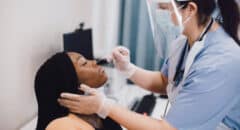
While the official COVID-19 public health emergency has ended, the virus hasn't disappeared.
Some of the special programs put in place during the pandemic have ended, however, and the University of Michigan offers a guide to help Americans understand what's changed and what hasn't.
Get vaccinated
What hasn't changed is that the virus continues to cause serious illness and death. So it's important for anyone six months of age or older to stay up to date on vaccination. COVID shots are still free, but check whether the location where you want to get yours is in your insurance network.
If you don't have insurance, free vaccination should be available at your local health department or other locations.
People aged 65 and older, and those who are immunocompromised, are eligible for a second bivalent booster shot.
RELATED: FDA Authorizes Spring COVID Booster for Certain Americans
Get tested
Rapid COVID tests are still available but you may have to pay for them now. Health departments and some clinics may still have some available for free, but major pharmacy chains will sell them.
If you need a PCR test, which provides more accurate results, your insurance may require you to bear part of the cost as a co-pay or as part of your deductible. You may need a doctor's order to get tested.
If a healthcare provider orders the test and you're on Medicaid, you may still be able to get the PCR test for free.
You may have to pay the full cost if you want a PCR test before traveling but have no symptoms or exposure.
Call your doctor
The virus is still contagious, so if you have COVID-19 symptoms or test positive, you should still stay away from other people and rest, the university advised. Call your doctor right away to find out if you should take a prescription medicine to treat it.
If you qualify because of age or health conditions, taking Paxlovid can both reduce your symptoms and lower your risk of severe disease. You must begin within five days of the start of your symptoms.
"Even if you currently take a medicine that might clash with Paxlovid, you may be able to pause taking that other medicine temporarily or change the dose," Dr. Preeti Malani, an infectious disease physician, said in a Michigan Medicine news release.
Paxlovid continues to be free for people covered by Medicare or Medicaid. It may also be free for others if the government still has a supply, though your insurance may require a co-pay.
Seek a doctor's care immediately if you experience serious symptoms such as trouble breathing, pain or pressure in the chest that doesn't go away; skin or nails that turn pale, blue or gray; or confusion.
RELATED: 8 Contagious Diseases On The Rise Right Now
Wear a mask
If you're recovering from COVID-19 or live with someone who is infected, wear a mask when in public.
Consider masking in public indoor spaces if you consider yourself at high risk, or live with or plan to visit someone who has a higher risk.
Just because masks are no longer required doesn't mean they aren't helpful in places where a lot of people are close together and ventilation is poor. Wearing a KN-95 or N-95 mask can reduce the likelihood of infection.
Always wear a mask around others when you have symptoms such as fever, runny nose or coughing, even if you don't have COVID-19. Stay home with symptoms such as fever, vomiting, diarrhea and pink eye.
You can still get COVID-19 data on the website of the U.S. Centers for Disease Control and Prevention, as well as those run by state and local governments.
Use telehealth if you prefer
Seeing a doctor via telehealth is still an option, if yours offers this service and it's what you prefer.
Those who are eligible for hospital-level care at home for any condition can still get it if their providers recommend it.
Patients, including children, who take prescription medicines that are controlled substances can keep getting those from a health care provider via telehealth through Nov. 11. These include opioid painkillers, sedatives, some ADHD medicines and treatments for opioid addiction.
Know your eligibility for Medicaid
If you have Medicaid coverage or your child is covered by CHIP (Children's Health Insurance Program), you should receive an important message from your state.
For three years, a yearly requirement to prove eligibility for these income-based programs was suspended. Now, you'll have to prove every year that you still qualify.
If you are no longer eligible for this coverage, other low-cost coverage may be available through healthcare.gov. You can enroll at any time after losing Medicaid coverage.









